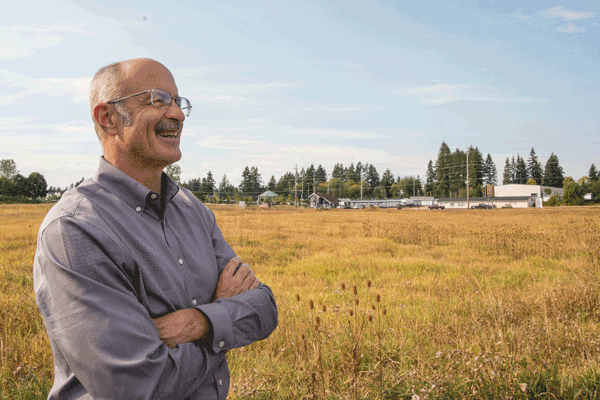With all the vacant land in Clark County, you’d think businesses wanting to move here would have no problem finding a location. It turns out that’s not the case.
According to industry experts, there is a shortage of ready-to-use sites for light industrial purposes, and a demand that isn’t being met.
“The problem we have is a lack of infrastructure on many properties that would be suitable for light industrial use, such as water and sewer and roads…” said Mike Bomar, president of the Columbia River Economic Development Council. “Our biggest problem is making sure that suitable properties are ready for companies when they need it.”
The economic development council acts as a kind of match-maker between local business interests, property owners and companies interested in moving here. And while there isn’t a large amount of property with infrastructure available in Clark County for light industrial use, Bomar said what we do have is high in quality.
“[Prospective companies] range from smaller companies with 50 to 100 employees to larger companies with 250 to 500 employees and up. They’re attracted to the quality of life here. We also are able to offer transportation options, including access to I-5, the Portland airport and rail,” Bomar said.
“Different companies are looking for different tax structures, and they look at Clark County or the other side of the river,” he added. “Oregon has no sales tax; we have no income tax. Non-consumer sales companies, such as technology and aircraft manufacturing do well in Washington because there is no income tax.”
Jim West, a commercial real estate broker with Coldwell Banker, knows the region’s struggle with light industrial property all too well. He said he has fielded calls this year from companies in Portland looking to move to Southwest Washington, but they end up staying in Oregon because they can’t find a spot.
“I’ve had three inquiries in the past month for light industrial sites of 10,000- to 15,000-square-feet of space where, when we surveyed the market, none seem to have the appetite to take that long,” West said. “They went back and looked in Portland. That being said, the situation is not much better in Portland. Things are tight there too.
“I’ve had several clients over the past eight months looking around for locations and it’s been difficult to find decent, or any, space,” he added. “Most are looking for 4,000- to 10,000-square-feet of space. They include medical-related companies, wholesalers and contractors. One electrical contractor wants space to lease or buy, but hasn’t been able to find it. A Portland piping contractor can’t find 8,000-square-feet of suitable space.”
The problem for these smaller industrial businesses, West said, is the time and cost it takes to develop infrastructure on land that doesn’t have it. Additionally, he said obtaining building permits from local government agencies remains an issue.
“It’s a long haul with permitting; it can take 18 months to two years to permit. For a lot of companies, it is a timeline issue. I don’t see a lot of folks here planning to build business parks as a result,” said West.
Despite the county’s lack of available, infrastructure-ready industrial space, West agreed with Bomar’s overall assessment that Southwest Washington remains an attractive option for businesses looking to expand and/or move.
“There are more and more traffic issues in Portland, and that makes us more attractive,” he said. “We have a little more wide open spaces here, especially if a company is trying to grow its business to the north toward Seattle. As a result, companies are looking to locate branches here.
“It’s a catch-22 in some ways. If we had a huge selection of available properties it probably would mean some landlords would be hurting,” West added. “We’d like to have more supply, but we also want landlords who are already here to have plenty of customers.”
While things may be slow on the new business front for light industrial, Bomar said that the CREDC is actively working on several projects that could bring new companies – and jobs – to Southwest Washington.
“We’re looking for a mix of companies to bring here and we have interest right now from companies looking to place their headquarters here, including manufacturers, biological science companies, medical services, and IT and software,” he said. “We have 14 active projects we’re working on right now. Some are companies wanting to relocate and some are expanding. Some are from other areas of the country and some are foreign, including Asia and Europe.”





